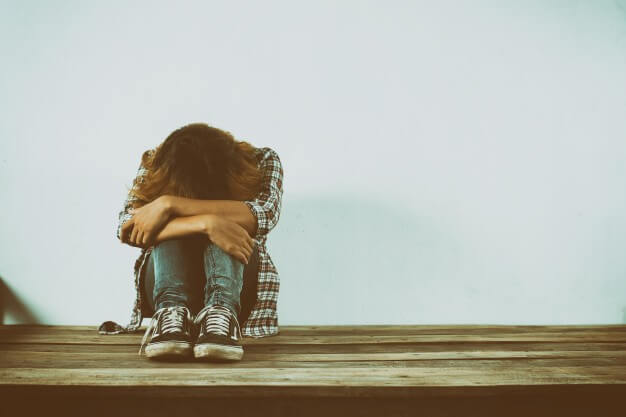Anxiety Depression

MOOD DISORDERS
Daily life is a roller coaster of feelings and emotions. You tend to feel on top of the world one day due to various reasons like a promotion or awesome grades in an exam. Another day you may feel downfallen in the dumps of problematic relation, financial troubles or various other reasons. All these oscillations in mood are normal that everyone witnesses on a daily basis. But if these mood swings start leaving an impact on your daily routine and your social life then, it is possible that you may be suffering from a mood disorder.
It is a mental health state that psychologists broadly use to explain all kinds of depression and bipolar disorders. Everyone from children to adults can have mood disorders. However, they all show different mood disorder symptoms. The diagnosis of mood disorders is difficult in children than adults and teens as they don't know how to express their feelings.
Types of Mood Disorders -
Here are the most common types of mood disorders:
- Major Depressive Disorder: Lacking interest in normal routine activities, feeling hopeless among other various symptoms for at least 2 weeks is a sign of depression.
- Dysthymia: This is a chronic, dangerous, depressed, or gloomy mood that lasts for a minimum of 2 years.
- Bipolar disorder: This is a condition in which a person has days of depression alternating with days of elevated mood or mania.
- Mood disorder associated with other health issues: Many medical ailments (like cancer, injuries, infections, and chronic diseases) can bring about symptoms of depression.
- Substance-induced mood disorder: Signs of depression that occur from drug abuse, medicine, exposure to toxins, alcoholism, or different forms of therapy.
Mood disorder symptoms :
An individual may undergo many symptoms of depression depending on the age and the kind of mood disorder. Here are some of the most general symptoms of a mood disorder:
- Continuous dark, anxious, or "blank" mood
- Feeling worthless or weak
- Having low self-confidence
- Feeling inadequate or useless
- Extreme and unnecessary guilt
- Recurring thoughts of destruction or suicide
- Lost interest in usual activities that were once enjoyed, including intercourse
- Relationship issues or marital & family conflict
- Difficulty sleeping or excess of sleep
- Weight or appetite changes
- Reduced energy
- Struggle concentrating
- Decreased decision-making ability
- Regular physical ailments (like headache, indigestion, or tiredness)
- Very sensitive to defeat or denial
- Anger, malice, or hostility
Feelings of euphoria, unusually high energy and mood fluctuations are the basic characteristics of manic moods. These elevated moods typically last for three or more days. Classic symptoms of mania include excessive or rapid talking, less sleep than normal, wavering mind, poor judgment, impulsiveness, and reckless decision making.
Hypomania and mania are days of hyperactive and excited behavior that have a notable impact on your daily routine. If you encounter mania or hypomania symptoms in the course of another mental health problem, like bipolar disorder or schizoaffective disorder, you may notice that the episode is followed by a phase of depression. After a hypomanic episode or manic episode, you might:
- feel quite miserable or embarrassed about how you behaved
- have made promises or taken on responsibilities that now find chaotic and unmanageable
- have just a few clear visions and memories of what happened while you were going through that period or none at all
- feel exhausted and need a lot of rest and sleep
Mood disorder treatment
Mood swing disorders are treated primarily by medicines like mood stabilizers and psychotherapy. Mood disorders persist throughout life even after undergoing treatment. Knowledge about mood disorders can help people suffering from these conditions identify the patterns of behavior and thought, indicating reappearance of a mood disorder and prompting them to get additional treatment.
Mostly, antidepressants and anti-anxiety pills are prescribed to individuals enduring mood disorders to relieve or lessen emotional pain. Most of the mental health practitioners recommend a combination of medicines with psychotherapy.
The main focus of psychotherapy is to change the patterns and behaviors of the one suffering from a mood disorder. Cognitive behavioral therapy is a benchmark treatment therapy for people dwelling with mood disorders. There is no cure for bipolar disorder but, CBT is considered one of the most effective bipolar disorder treatment to manage it effectively. This treatment has a significant positive effect on people suffering from mood disorders. In some cases, psychotherapy alone is sufficient to take care of a mood disorder.
Contact Us for professional help. CALL US TO SCHEDULE A FIRST AVAILABLE APPOINTMENT NOW AT: (713) 904-5222.
Since 1995 our team of experts have provided counseling & coaching for individuals, families and fortune-five corporations alike. We are ready to help you and yours to thrive! Call us to schedule a first available now at: (713) 904-5222



